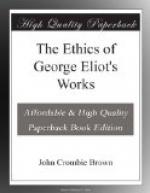And this thought of the Divine unity, thus intensely pervading the national life, upfolds within capacity of indefinite development. No long time in the life of a nation elapses ere “The Lord thy God is a jealous God, visiting the iniquity of the fathers upon the children,” became “As a father pitieth his children, so the Lord pitieth them that fear Him.” “Can a woman forget her sucking child, that she should not have compassion on the son of her womb? Yea, she may forget; yet will not I forget thee.”
In no sense of the word was the Jew a creature of imagination. The stern and hard realities of his life would seem to have crushed out every trace of the aesthetic element within him. Yet from among these people arose a literature, especially a hymnology, which has never been approached elsewhere; and it arose emphatically and distinctly out of the great central and animating thought of the Divine unity. To the Psalms so-called of David, the glorious outbursts of sacred song in their mythico-historical books, as in Isaiah {103} and some of the minor prophets, the finest of the Vedic or Orphic hymns or the Homeric ballads are cold and spiritless. These address themselves to scholars alone, or chiefly to a cultivated few, and address themselves to them eloquently and gloriously. The hymns of the Jews have so interpenetrated the very heart of humanity, so identified themselves with the best longings, the noblest aspirations, the purest hopes, and the deepest sorrows of man, that still, after more than twenty centuries, that wonderful hymnology breathes up day after day, week after week, from millions of households and hearts. They outbreathe its fervid aspirations toward a purer and diviner life. They give expression to its profound wailings over degradation and fall. They give utterance on all the inscrutable mysteries of existence; and ever and anon as the clouds and darkness break away from the Infinite Love,—they burst forth into the exultant cry, “God reigneth, let the earth be glad. . . . Give thanks at remembrance of His holiness.”
But important as is this factor of Judaism, there is another generally considered which has perhaps exercised a still more profound and cumulative influence on the civilisation especially of the West. This lies in the intense indestructible nationality of the race. Eighteen centuries have passed since they became a people, “scattered and peeled,” their “holy and beautiful house” a ruin, their capital a desolation, their land proscribed to the exile’s foot. During these centuries deluge after deluge of so-called barbarians has swept over Asia and Europe: Hun and Tartar, Alan and Goth, Suev and Vandal,—we attach certain vague meanings to the names, but can the most learned scholar identify one individual of the true unmingled blood? All have disappeared, merged in the race they overran, in the kingdoms they conquered and devastated. The Jew alone, through these centuries, has remained




